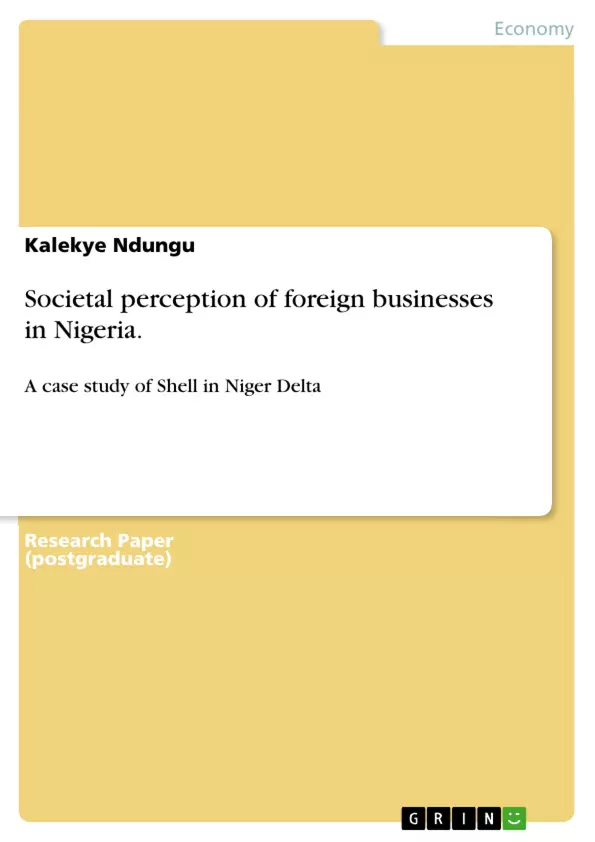The oil and gas industry is one of the largest industries in the world. International Energy Agency estimates that in the next 25 five years, an overall $3 trillion global worth of investment is likely to be made in this industry. Astonishingly, this large investment accounts for only 6% or lesser of the expected revenues during the next 25 years from this industry (McPherson and MacSearraigh 2007). The gross oil and gas sales revenue are estimated to be $1.5 trillion per year. Moreover, since the oil and gas commodities are sold multifold within a supply chain, the volume of worldwide oil and gas trade is even much bigger. Due to the large volume of oil and gas revenues, this industry is often directly linked to the economic and social wellbeing of nations. For a foreign business operating within oil and gas industry in overseas market to bolster its relationships with its stakeholders to sustain its growth and profitability, it is crucial that its activities are perceived to instigate economic and social wellbeing for the nation.
The global demand for oil and gas continues to increase due to the rising income level and population in most of the developing countries. Due to the rising demand of oil and gas commodity, the control over oil and gas resources can be a concrete source of enrichment and driver for development. However, the very reason that makes oil and gas business such a high value industry also makes it prone to controversies, bad governance, corruption and driver of conflict. Many oil and gas rich countries including Nigeria, Indonesia, Sudan, Liberia, and Bolivia among many others are salient examples of this contention. The matter of controlling these valuable natural resources and the right over the revenues generated from them is the cause of varying conflicts. It is reflected through the fact that throughout the 20th century and most of the 21st century, most of the developing nations of the world rich in oil and gas were marred by high level of political instability as well as high level of poverty and underdevelopment (Karl, 1997; Ross, 2001; Eifert et alet al. 2002). By being at the helm of affairs, foreign oil and gas companies operating in these regions are often viewed as part of the problem.
Inhaltsverzeichnis (Table of Contents)
- Abstract
- Introduction
- Societal Perception of Foreign Oil and Gas Companies
- Corruption
- Lack of Social Responsibility
Zielsetzung und Themenschwerpunkte (Objectives and Key Themes)
This study examines the societal perception of Shell, a foreign oil and gas company, in Nigeria. The focus is on evaluating the company's corporate social responsibility (CSR) practices and their impact on public opinion. The study aims to understand how Shell's operations, particularly in the Niger Delta region, are perceived by both its employees and the general public.
- Societal perception of foreign oil and gas companies in developing nations
- The role of corporate social responsibility (CSR) in mitigating negative perceptions
- The impact of corruption and lack of transparency on public opinion
- The relationship between oil and gas extraction and social and political unrest
- The effectiveness of CSR initiatives in fostering positive societal outcomes
Zusammenfassung der Kapitel (Chapter Summaries)
The abstract introduces the study's focus on evaluating Shell's societal perception in Nigeria. The introduction provides context by highlighting the global significance of the oil and gas industry and its potential impact on national economic and social wellbeing. It also emphasizes the challenges faced by foreign oil and gas companies in developing nations, particularly those associated with corruption, resource control, and conflict.
The section on societal perception delves into the factors contributing to negative public opinion regarding foreign oil and gas companies. It explores the role of corruption and lack of transparency in government finances, highlighting the impact on local communities. This section also emphasizes the challenges related to implementing effective CSR initiatives, particularly in regions marred by poverty and instability.
Schlüsselwörter (Keywords)
The key focus topics of this study are: societal perception, foreign oil and gas companies, corporate social responsibility (CSR), corruption, lack of transparency, Niger Delta, Shell, Nigeria, developing countries, and public opinion.
Frequently Asked Questions
How is Shell perceived by the public in Nigeria?
Public perception of Shell, especially in the Niger Delta, is often negative due to issues like corruption, lack of transparency, and the perceived link between oil extraction and social unrest.
What role does Corporate Social Responsibility (CSR) play for foreign oil companies?
CSR is intended to mitigate negative perceptions and bolster relationships with stakeholders by contributing to the economic and social wellbeing of the host nation.
Why does the oil and gas industry often lead to conflict in developing nations?
The high value of the industry makes it prone to bad governance, corruption, and disputes over resource control and revenue distribution.
What are the main challenges for foreign businesses in Nigeria's oil sector?
Key challenges include political instability, high levels of poverty in oil-rich regions, and being viewed as "part of the problem" regarding local underdevelopment.
How does transparency affect the reputation of foreign companies?
A lack of transparency in government finances and corporate operations often leads to public distrust and accusations of complicity in corruption.
- Citar trabajo
- Kalekye Ndungu (Autor), 2011, Societal perception of foreign businesses in Nigeria., Múnich, GRIN Verlag, https://www.grin.com/document/267045



